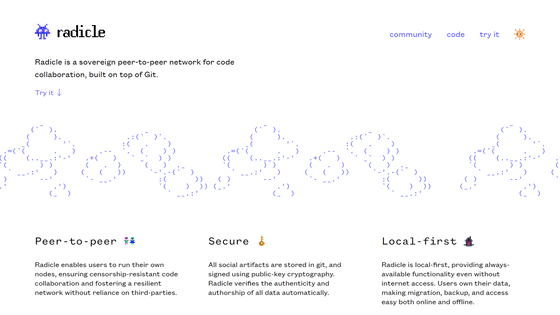What is 'Radicle', a code collaboration network system that shares Git via P2P? explained by the developer

Radicle is an open source software that allows users to share Git repositories through P2P, allowing users to run their own nodes and develop collaboratively with others without relying on third parties or being censored. . The developer of Radicle appeared in the comments section of the news site
Radicle: sovereign code infrastructure
https://radicle.xyz/

Radicle: Open-Source, Peer-to-Peer, GitHub Alternative | Hacker News
https://news.ycombinator.com/item?id=39600810
Q : Since P2P started being used as a buzzword, it has taken on a very wide range of meanings, so I'd like to see a definition of exactly what it means here.
A : As Wikipedia says, it means 'computers connected to a network communicate directly with each other on an equal footing and function.' That is, a system in which all participants have equal privileges within the network.
Q : How is it different from file sharing applications like BitTorrent, winny, etc., where people just shared arbitrary copyrighted content like movies, music, software, etc.?
A : Each user can choose which repositories to host according to fairly granular policies. This means you can easily block content you don't want to seed, or configure your nodes to only host content you explicitly allow.
You can also choose a public node to connect to if you don't want to connect to a random node on the network. However, I don't think most users will choose this method, as they are likely to miss out on content they are interested in.
Git, which Radicle shares, can replicate any content, but it's not particularly suited to managing large binary files like movies or music, so even if Radcle becomes popular, that kind of content will continue to be I expect it to be shared on BitTorrent.

A : We cannot disclose the budget. The development team is around 12 people and has been working on this task for over 4 years in total. Our current codebase is about 2 years old, and we started using it internally a year ago. We have just started registering, but many people in our community have already started using it.
Q : Why go to the trouble of creating a GitHub clone when there is already a site called GitHub that allows you to share Git repositories?
A : Because we don't want to use a platform that is owned and controlled by a third party. Just as it is undesirable for third parties to manage personal items such as operating systems, text editors, kitchens, furniture, clothes, books, and music by determining whether they are appropriate or inappropriate, code I am uncomfortable with the idea that I should just use GitHub, a third party.
Q : I believe Git is originally open source and p2p. However, Git doesn't have issues, wikis, discussions, GitHub Pages, or a developer profile network, so what about embedding these features into Git itself?
A : Although Git was designed for P2P in a sense, it cannot be directly deployed to a P2P network; all deployments use a client-server model. Additionally, there is no way to verify that the repository downloaded after a ``git clone'' is the correct one, so the clone must be done from a trusted server, and is not compatible with P2P. Radicle solved this problem by assigning stable IDs to repositories and allowing local validation.

Q : Aren't you planning on creating a package instead of installing with 'curl | bash'?
A : We are developing packages for Linux and macOS.
Q : Are there any plans to support Windows?
A : Although the development team would like to support Windows, targeting only Unix-compatible operating systems such as Linux and macOS will allow us to release more quickly. In principle, there was no problem with porting to Windows, but since no one on the development team was running Windows, it was difficult to verify operation. However, we will use time to support Windows if there is demand.
Please note that the documentation explains how to use Radicle and how the protocol works, so if you are interested, please check it out.
◆Forum now open
A forum related to this article has been set up on the GIGAZINE official Discord server . Anyone can write freely, so please feel free to comment! If you do not have a Discord account, please create one by referring to the article explaining how to create an account!
• Discord | 'When does 'Radicle', which allows you to share and manage Git repositories via P2P, be useful? ' | GIGAZINE
https://discord.com/channels/1037961069903216680/1214862066683220010
Related Posts:
in Software, Posted by log1d_ts







